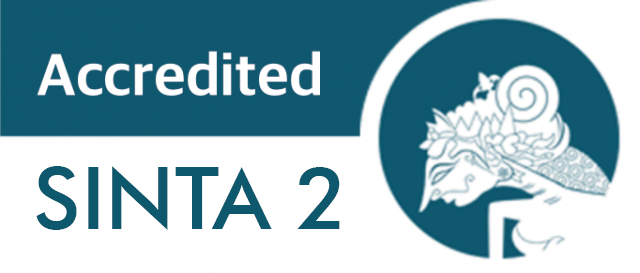Empowering character building-based education: Discourse analysis on official English textbook
DOI:
https://doi.org/10.15408/tjems.v6i1.10354Keywords:
pembangunan karakter, character building, text book, nation ideology, education, buku teks, ideologi bangsa, pendidikanAbstract
Abstract
Pancasila is the ideology of the nation and becomes the foundation of Indonesian characters. However, based on the reality, there were many Indonesian’s characters that are far below expectation of the standard in Butir-butir Pancasila (Items of Pancasila), as a further explanation of the values in Pancasila. Therefore, it is needed to introduce of Pancasila and its 45 items in our formal education system. Textbook still become the primary media formal education schools. By assessing several books which were published by distinguished publishers and used in schools, it was found that they included only a very few of those items. This study was held to know if character points of Pancasila which Indonesian learners need to know have been included in the textbooks titled When English Rings the Bell: Buku Siswa and When English Rings the Bell: Buku Guru which were officially published by the Educational and Cultural Ministry of Indonesia and used the primary textbook in models schools as the implementation of Kurikulum 2013. The findings showed that as the official textbook has adequate number of Pancasila items in it. However, the teachers’ role was still the most important factor to make those items were known and can be applied.
Abstrak
Pancasila adalah ideologi bangsa dan menjadi fondasi karakter Indonesia. Namun, berdasarkan kenyataan, ada banyak karakter Indonesia yang jauh di bawah ekspektasi standar dalam Item Pancasila, sebagai penjelasan lebih lanjut tentang nilai-nilai dalam Pancasila. Oleh karena itu, perlu untuk memperkenalkan Pancasila dan 45 poinnya dalam sistem pendidikan formal kita. Buku teks masih menjadi media pendidikan formal sekolah dasar. Dengan menilai beberapa buku yang diterbitkan oleh penerbit terkemuka dan digunakan di sekolah-sekolah, ditemukan bahwa mereka hanya memasukkan sedikit dari barang-barang itu. Penelitian ini diadakan untuk mengetahui apakah poin-poin karakter Pancasila yang perlu diketahui oleh pelajar Indonesia telah dimasukkan dalam buku teks berjudul When English Rings the Bell: Books Student and When English Rings the Bell: Books's Teacher yang secara resmi diterbitkan oleh the Educational and Kementerian Kebudayaan Indonesia dan menggunakan buku teks utama di sekolah-sekolah model sebagai implementasi dari Kurikulum 2013. Temuan menunjukkan bahwa sebagai buku teks resmi memiliki jumlah beberapa poin Pancasila yang memadai di dalamnya. Namun, peran guru masih merupakan faktor terpenting untuk membuat item-item itu diketahui dan dapat diterapkan.
How to Cite : Husna, N., Kamar, T. L.. (2019). Empowering Character Building-Based Education: an Evaluation on Official English Textbook. TARBIYA: Journal of Education in Muslim Society, 6(1), 58-68. doi:10.15408/tjems.v6i1.10354.
References
Akbar, S. (2013). Instrumen Perangkat Pembelajaran. Bandung: PT. Remaja Rosdakarya.
Ali, A. (2014, July 10). Roda Dua Blog: 45 Butir-butir Pedoman Pengamalan Pancasila Terbaru . Dipetik August 18th, 2015, dari http://roda2blog.com/2014/07/10/45-butir-butir-pedoman-pengamalan-pancasila-terbaru/
Almerico, G. M. (2014). Building character through literacy with children’s literature. Research in Higher Education Journal, 26, 1-13.
Anderson, R. C. (1984). Interestingness of children's reading material. Illionis: Center for the Study of Reading Technical Report.
Bencivenga, A. S., & Elias, M. J. (2003). Leading schools of excellence in academics, character, and social-emotional development. Nassp Bulletin, 87 (637), 60-72.
Chen, C., & Uttal, D. H. (1988). Cultural values, parents’ beliefs, and children’s achievement in the United States and China. . Human Development, 31(6), 351-358.
Cunningsworth, A. (1995). Choosing Your Coursebook. Oxford: Cambridge University Press.
Elias, M. J. (2009). Social-emotional and character development and academics as a dual focus of educational policy. Educational Policy, 23(6), 831-846.
Elias, M. J. (2009). Social-emotional and character development and academics as a dual focus of educational policy. . Educational Policy, 23(6), 831-846.
Gudmundsdottir, S. (1990). Values in pedagogical content knowledge. Journal of Teacher Education, 41(3), 44-52. Diambil kembali dari https://doi.org/10.1177/002248719004100306
Harmer, J. (1996). The Practice of English Language Teaching. Essex: Longman.
Herdiawanto, H., & Hamdayama, J. (2010). Cerdas, kritis, dan aktif berwarganegara (Pendidikan Kewarganegaraan untuk Perguruan Tinggi. Jakarta: Penerbit Erlangga.
Herdiawanto, H., & Hamdayama, J. (2010). Cerdas, Kritis, dan Aktif Berwarganegara (Pendidikan Kewarganegaraan untuk Perguruan Tinggi”, 32. Jakarta: Penerbit Erlangga.
Kaelan. (2008). Pendidikan Pancasila. Yogyakarta: Paradigma Offset.
Kahne, J., & Westheimer, J. (2003). Teaching Democracy: What Schools Need to Do. Democracy and Civic Engagement, 85(1), 34-66 . doi:https://doi.org/10.1177/003172170308500109
Kilpatrick, W., Wolfe, G., & Wolfe, S. M. (1994). Books that build character. New York: Simon & Schuster.
Lareau, A. (1987). Social class differences in family-school relationships: The importance of cultural capital. Sociology of education , 60(2), 73-85.
Lickona, T. (2009). Educating for character: How our schools can teach respect and responsibility. Bantam.
Listyarti, R. (2012). Pendidikan Karakter dalam Metode Aktif, Inovatif, dan Kreatif. Jakarta: Esensi.
Lumpkin, A. (2008). Teachers as role models teaching character and moral virtues. Journal of Physical Education, Recreation & Dance, 79(2w), 45-50.
Mackenzie, M. (1909). Moral Education: The Training of the Teacher. International Journal of Ethics, 19(4), 419-426. Diambil kembali dari https://www.jstor.org/stable/2377013
Marzuki. (2012). Pendidikan Karakter dan Pengintegrasiannya dalam Pembelajaran, unpublished paper on Seminar dan Lokakarya Pendidikan Karakter. Kediri: STAIN Kediri.
Marzuki. (t.thn.). Konsep Dasar Pendidikan Karakter, not published. Yogyakarta: FIS, Universitas Negeri Yogyakarta. Diambil kembali dari http://staff.uny.ac.id/sites/default/files/lain-lain/dr-marzuki-mag/Dr.%20Marzuki,%20M.Ag_.%20Konsep%20Dasar%20Pendidikan%20Karakter.pdf.
Novick, B., Kress, J. S., & Elias, M. J. (2002). Building learning communities with character: How to integrate academic, social, and emotional learning. ASCD. Alexandria, Virginia: Association for Supervision and Curriculum Development (ASCD).
O'Sullivan, S. (2004). Books to Live by: Using Children's Literature for Character Education. The Reading Teacher, 57(7), 640-645 . Diambil kembali dari https://www.jstor.org/stable/20205410
Pala, A. (2011). The need for character education. International Journal of Social Sciences and Humanity Studies, 3(2), 23-32.
Park, N., & Peterson, C. (2009). Strengths of character in schools. Dalam M. J. Furlong, R. Gilman, & E. S. Huebner, Handbook of Positive Psychology in Schools (hal. 65-76). Ney York: Routledge.
Putnam, R. D. (1993). The prosperous community. The american prospect, 4(13), 35-42.
Rahimpour, M. (2011). Textbook Selection and Evaluation in EFL Context. World Journal of Education(October), 62-68.
Ryan, K., & Bohlin, K. E. (1999). Building Character in Schools: Practical Ways To Bring Moral Instruction to Life. San Francisco, California: Jossey-Bass Inc.
Sosik, J. J. (2015). Leading with character 2nd edition: Stories of valor and virtue and the principle they teach. Charlotte, North Caroline: Information Age Publishing, Inc.
Spears, L. C. (2010). Character and servant leadership: Ten characteristics of effective, caring leaders . The Journal of Virtues & Leadership, 1(1), 25-30.
Tapanes, M. A., Smith, G. G., & White, J. A. (2009). Cultural diversity in online learning: A study of the perceived effects of dissonance in levels of individualism/collectivism and tolerance of ambiguity. The Internet and Higher Education, 12(1), 26-34. doi:https://doi.org/10.1016/j.iheduc.2008.12.001.
Ubaedillah, A., & Rozak, A. (2000). Pendidikan Kewarganegaraan: Demokrasi, Hak Asasi Manusia, dan Masyarakat Madani edisi ketiga. Jakarta: ICCE UIN Syarif Hidayatullah Jakarta and Penerbit Prenada Media Group.











